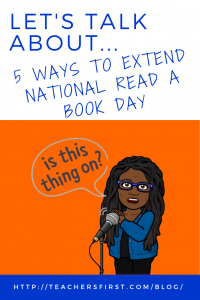Today is National Read A Book Day, which gives us an extra reason to pick up a book and immerse ourselves in a new and different world. Sometimes, making a short stop in that alternate place is not enough. Students may need to extend the experience to learn about the text’s characters, periods, and themes. Here are five ways to enhance the book reading experience so students can make the most of their time immersed in it.
Flip Events: Available both live and on-demand, many Flip (reviewed here) events feature authors who discuss their inspiration and writing process. Other Flip events provide factual information from experts to explain current events and STEM-based topics. Use these to help students expand their background knowledge and prompt conversations about the book, the author, and related themes.
Bookopolis (reviewed here): Sometimes referred to as “Goodreads for kids,” Bookopolis is a social network for K-8 kids based around sharing books. Encourage students to earn points and badges by reading and reviewing books, shelving books they have read or want to read, and connecting with others who share the same reading interests. Students can also enter giveaways and share books they recommend with friends.
Reading Treks: Created to help learners better understand the context of a book, Reading Treks provide a map that follows the path traveled in a book. Along the way, the map includes pictures, videos, and other anecdotes to help students better understand what was happening in the text at that particular place. Understanding the context helps students with their reading comprehension and provides a way to help students build generalized background knowledge. These are especially helpful for students with limited access to books and life experiences.
Audiobooks: Since many of our students need help reading, audiobooks are a great way to keep them engaged in the text. Loyal Books (reviewed here) and Lit2Go (reviewed here) provide free audiobooks recorded from books in the public domain. Check the books before recommending them, as some classic books may not be as culturally sensitive as we would like.
Author websites: Many authors have websites where they publish activities that go along with their books. Check out the sites for Jarrett Lerner, Mo Willems, or Josh Funk. Sometimes, websites dedicated to a specific character like Junie B Jones or Judy Moody also have activities. Using the activities from the sites to extend the reading experience can sometimes be more straightforward as many include teacher guides and activities.
As a bonus, if you are working with early childhood students, check out Unite for Literacy (reviewed here). Their site allows you to change the written language and narration of books so that your students can have the book read in their native language or the language that they are learning.
Do you have additional ideas for extending book reading experiences? Please share them in the comments below.


